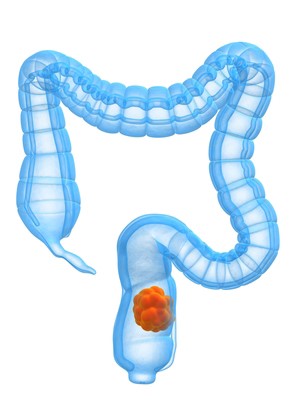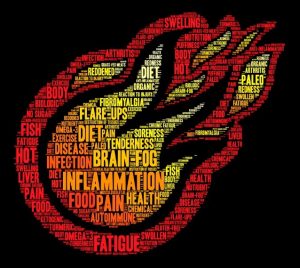How Can You Reduce Colon Cancer Risk?
Author: Dr. Stephen Chaney
 Colorectal cancer is third most common form of cancer in the United States. The American Cancer Society estimates that there will be 140,000 new cases and 50,000 deaths from colorectal cancer in 2018. The death rate has been decreasing due to more aggressive screening, but it is still much too high.
Colorectal cancer is third most common form of cancer in the United States. The American Cancer Society estimates that there will be 140,000 new cases and 50,000 deaths from colorectal cancer in 2018. The death rate has been decreasing due to more aggressive screening, but it is still much too high.
Thus, there is considerable interest in discovering colon cancer prevention we can control. Several studies have suggested that inflammatory diets may be one preventable cause of colon cancer. There are many reasons for suspecting that inflammation may increase colon cancer risk. For example, we know:
- Inflammation plays an important mechanistic role in cancer development.
- Obesity causes a chronic state of low-grade inflammation, and obesity increases colon cancer risk.
- Inflammatory bowel disease increases the risk of colon cancer.
- Anti-inflammatory medications such as aspirin decrease colon cancer risk.
However, it has been difficult to prove that inflammatory diets increase colon cancer risk. In part, that is because we can’t measure inflammation directly. We must rely on inflammatory markers such as C-reactive protein (CRP), interleukin-6 (IL-6) and tumor necrosis factor (TNF). Unfortunately, these markers correlate with different inflammatory processes in the body and seldom increase or decrease in unison.
The authors of the current study (FK Tabung et al, JAMA Oncology, 4: 366-373, 2018 ) used a dietary scoring system based on all three inflammatory markers to examine the correlation between an inflammatory diet and colon cancer risk.
How Was The Study Done?
 This study made use of data collected from 46,804 men enrolled in the Health Professionals Follow-up Study (conducted between 1986 and 2012) and 74,246 women enrolled in the Nurses’ Health Study (conducted between 1984 and 2012). Lifestyle, medical, and other health-related information were collected every 2 years. A comprehensive dietary questionnaire was administered every 4 years. During the 26-year follow-up period 2699 cases of colon cancer were diagnosed.
This study made use of data collected from 46,804 men enrolled in the Health Professionals Follow-up Study (conducted between 1986 and 2012) and 74,246 women enrolled in the Nurses’ Health Study (conducted between 1984 and 2012). Lifestyle, medical, and other health-related information were collected every 2 years. A comprehensive dietary questionnaire was administered every 4 years. During the 26-year follow-up period 2699 cases of colon cancer were diagnosed.
The inflammatory potential of the diet was estimated using an index called the empirical dietary inflammation pattern (EDIP) score that the authors had developed in a previous study (FK Tabung et al, Journal of Nutrition, 146: 1560-1570, 2016 ). This index was based on the effects of individual foods on all three markers of inflammation (CRP, IL-6, and TNF). Inflammatory foods had positive EDIP scores (they increased levels of one or more of the inflammatory markers). Anti-inflammatory foods had negative EDIP scores (they decreased levels of one or more inflammatory markers).
Most of the EDIP scores were consistent with previous studies on the inflammatory potential of various foods. For example:
- Red meats, processed meats, refined grains, sugar-sweetened beverages, and diet beverages all scored as highly inflammatory.
- One serving of beer or wine, coffee, dark yellow vegetables, and leafy green vegetables all scored as highly anti-inflammatory.
Colon Cancer Prevention By Avoiding Inflammatory Diets
 The subjects enrolled in the study were divided into five groups based on their inflammatory diet (EDIP) scores. When the investigators compared subjects who had the most inflammatory diet with subjects who had the least inflammatory diet:
The subjects enrolled in the study were divided into five groups based on their inflammatory diet (EDIP) scores. When the investigators compared subjects who had the most inflammatory diet with subjects who had the least inflammatory diet:
- The risk of colon cancer was increased by 44% in men and 22% in women.
- People who refrain from alcohol consumption received even greater benefit from anti-inflammatory diets. For teetotalers an anti-inflammatory diet decreased colon cancer risk by 62% in men and 33% in women.
The authors concluded: “Findings from this large prospective [that is scientific jargon meaning the study was carried out over a period of many years] study support a role for the inflammatory potential of diet in colorectal cancer development, suggesting inflammation as a potential mechanism linking dietary patterns and colorectal cancer development.”
How To Prevent Colon Cancer Or At Lest Reduce The Risk?
 Of course, holistic approaches are always best. Reducing colon cancer risk involves much more than simply consuming an anti-inflammatory diet. To put this study in perspective, let’s look at what the American Cancer Society recommendations about modifiable lifestyle factors that increase your risk of colon cancer. So, consider these when you think about colon cancer prevention. I call this the 10,000-foot view because they only list the biggest contributors to colon cancer – the ones for which there is the most scientific evidence (I have put their exact comments in quotes):
Of course, holistic approaches are always best. Reducing colon cancer risk involves much more than simply consuming an anti-inflammatory diet. To put this study in perspective, let’s look at what the American Cancer Society recommendations about modifiable lifestyle factors that increase your risk of colon cancer. So, consider these when you think about colon cancer prevention. I call this the 10,000-foot view because they only list the biggest contributors to colon cancer – the ones for which there is the most scientific evidence (I have put their exact comments in quotes):
#1: Being overweight or obese. “If you are overweight or obese your risk of developing and dying from colorectal cancer is higher”.
#2: Physical inactivity. “If you are not physically active, you have a greater chance of developing colon cancer.”
#3: Certain types of diets.
- “A diet that’s high in red meats (such as beef, pork, lamb, or liver) and processed meats (like bacon, sausage, hot dogs and some luncheon meats) raises your colorectal cancer risk.” My comment: The evidence is stronger for red meats and processed meats than for any other foods. Processed meats are listed as likely carcinogens and red meats are listed as probable carcinogens by the International Agency For Research On Cancer (IARC), an agency of the WHO.
- “Cooking meats at very high temperatures (frying, broiling, or grilling) creates chemicals that may raise your cancer risk.”
#4: Smoking. “People who have smoked for a long time are more likely than non-smokers to develop and die from colorectal cancer.”
#5: Heavy alcohol use. “Colorectal cancer has been linked to moderate to heavy alcohol use. Limiting alcohol use to no more than 2 drinks a day for men and 1 drink a day for women could have many health benefits, including a lower risk of many kinds of cancer. “
#6: Early detection. In case you have not heard, the American Cancer Society just released new guidelines recommending that screening for colon cancer begin at age 45.
If you want to take a closer look at the diet – colon cancer connection, you might be interested in the recommendations of Harvard’s Men’s Health Watch newsletter.
- In terms of inflammatory foods that increase colon cancer risk, they list red meats, fried foods, sugary beverages, and refined carbohydrates.
- In terms of anti-inflammatory foods that likely decrease cancer risk, they list tomatoes, olive oil, green leafy vegetables, nuts like almonds and walnuts, fatty fish, and fruits like strawberries, blueberries, cherries, and oranges.
What Does This Mean For You?
 If you are confused about the conflicting information about which foods affect colon cancer risk, start with the American Cancer Society recommendations. Avoid red meats and processed meats as much as possible and don’t cook your meats at high temperatures. I realize this is not popular advice at the time of year when everyone is firing up their grills for summer cookouts, but these recommendations will go a long way towards colon cancer prevention. Don’t shoot the messenger. I’m just conveying information based on the best scientific evidence we have to date.
If you are confused about the conflicting information about which foods affect colon cancer risk, start with the American Cancer Society recommendations. Avoid red meats and processed meats as much as possible and don’t cook your meats at high temperatures. I realize this is not popular advice at the time of year when everyone is firing up their grills for summer cookouts, but these recommendations will go a long way towards colon cancer prevention. Don’t shoot the messenger. I’m just conveying information based on the best scientific evidence we have to date.
For best results follow the recommendations of the Harvard Men’s Health Watch newsletter to also avoid fried foods, sugary beverages and refined carbohydrates and add anti-inflammatory foods such as fresh fruits & vegetables, nuts, olive oil, and fatty fish.
With Harvard’s recommendations in mind, let me extend an olive branch to all of you red meat lovers. An ounce or two of red meat in a green salad or a stir fry with lots of fresh, colorful vegetables is much less likely to increase your risk of cancer than a steak or burger with fries. You will find more information on this topic in my book “Slaying The Food Myths.”
The Bottom Line:
A major study has just been published looking at the correlation between an inflammatory diet and colon cancer risk. When the investigators compared subjects who had the most inflammatory diet with subjects who had the least inflammatory diet:
- The risk of colon cancer was increased by 44% in men and 22% in women.
- People who refrain from alcohol consumption received even greater benefit from anti-inflammatory diets. For teetotalers an anti-inflammatory diet decreased colon cancer risk by 62% in men and 33% in women.
The authors concluded: “Findings from this large study support a role for the inflammatory potential of diet in colorectal cancer development, suggesting inflammation as a potential mechanism linking dietary patterns and colorectal cancer development.”
If you are confused about the conflicting information about which foods are inflammatory and anti-inflammatory, start with the American Cancer Society recommendations. Avoid red meats and processed meats as much as possible and don’t cook your meats at high temperatures. I realize this is not popular advice at the time of year that everyone is firing up their grills for summer cookouts, but these recommendations will go a long way towards colon cancer prevention.
For best results follow the recommendations of the Harvard Men’s Health Watch newsletter to also avoid inflammatory foods such as fried foods, sugary beverages and refined grains and add anti-inflammatory foods such as fresh fruits & vegetables, nuts, olive oil, and fatty fish.
With Harvard’s recommendations in mind, let me extend an olive branch to all of you red meat lovers. An ounce or two of red meats in a green salad or a stir fry with lots of fresh, colorful fruits and vegetables is much less likely to increase your risk of cancer than a steak or burger with fries. You will find more information on this topic in my book “Slaying The Food Myths.”
For more details on the American Cancer Society and Harvard recommendations and colon cancer prevention, read the article above:
These statements have not been evaluated by the Food and Drug Administration. This information is not intended to diagnose, treat, cure or prevent any disease.
